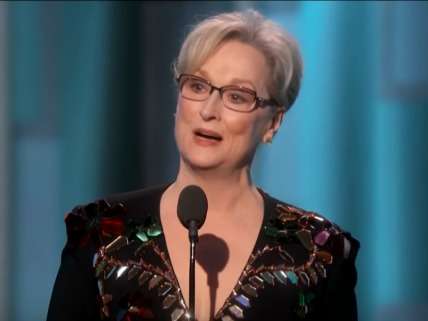Donald Trump Is a Jerk, but That Does Not Make Meryl Streep an Underdog
The award-winning movie star implausibly portrays herself and her famous friends as vilified dissidents.

Accepting a lifetime achievement award at yesterday's Golden Globes ceremony, Meryl Streep demonstrated once again the uncanny ability of anti-Trump celebrities to alienate potential allies while reinforcing the anti-P.C. backlash that helps explain the billionaire bully's improbable rise as a truth-telling champion of the common man. Streep, who opened by saying she had lost her voice "in screaming and lamentation this weekend," offered some accurate criticism of Trump but wrapped it in a condescending, self-congratulatory package of progressive smugness.
I basically agree with the heart of Streep's speech, which recalled Trump's mockery of New York Times reporter Serge Kovaleski's physical disability as a revealing low point of the president-elect's campaign:
There was one performance this year that stunned me. It sank its hooks in my heart. Not because it was good; there was nothing good about it. But it was effective, and it did its job. It made its intended audience laugh, and show their teeth. It was that moment when the person asking to sit in the most respected seat in our country imitated a disabled reporter. Someone he outranked in privilege, power and the capacity to fight back. It kind of broke my heart when I saw it, and I still can't get it out of my head, because it wasn't in a movie. It was real life. And this instinct to humiliate, when it's modeled by someone in the public platform, by someone powerful, it filters down into everybody's life, because it kinda gives permission for other people to do the same thing. Disrespect invites disrespect; violence incites violence. And when the powerful use their position to bully others, we all lose.
Trump was not disciplined enough to avoid looking like a cruel eighth-grader, but he is smart enough to understand that he did not come off well in that episode, which is why he has repeatedly insisted it was not what it looked like. He did so again when The New York Times asked him about Streep's speech. "I was never mocking anyone," Trump told the Times. "I was calling into question a reporter who had gotten nervous because he had changed his story….People keep saying I intended to mock the reporter's disability, as if Meryl Streep and others could read my mind, and I did no such thing." As disturbing as Trump's Serge Kovaleski impression was, his dishonest defense of it may be even more troubling, since it illustrates our next president's tendency to lie rather than admit a mistake (as does his wild claim about New Jersey Muslims celebrating the 9/11 attacks, which he was trying to justify when he made fun of Kovaleski).
Although Streep made a valid point about Trump's character, her speech as a whole was off-putting because of the way it flattered her audience at the award ceremony while gratuitously insulting Americans with different political and cultural preferences. "You and all of us in this room really belong to the most vilified segments in American society right now," she told the foreign critics, movie stars, and TV actors at the Beverly Hilton. "Think about it: Hollywood, foreigners, and the press."
Noting that Hollywood employs "a bunch of people from other places," Streep recited the birthplaces, several of them foreign, of the award nominees listening to her speech. "Hollywood is crawling with outsiders and foreigners," she said. "And if we kick them all out, you'll have nothing to watch but football and mixed martial arts, which are not the arts."
Thus did Meryl Streep, a rich, successful, widely admired, award-winning movie star, implausibly portray herself as a vilified outsider while dismissing many, if not most, of her fellow Americans as yokels with no appreciation for "the arts" (which evidently include She-Devil and Mamma Mia! but not Monday Night Football). And where did Streep get the idea that Trump, a cultural liberal who is himself a representative of Hollywood as a reality TV star and producer, either embraces the social-conservative critique of the entertainment industry or wants to prevent foreign-born creators and performers from participating in it? Trump, who married a model from Czechoslovakia and another from Slovenia, floated several alarming immigration proposals during his campaign, but they did not include any policy that would preclude Ruth Negga, Ryan Gosling, or Dev Patel from working in the United States.
Streep, a Hillary Clinton supporter who spoke at the Democratic convention last summer, has trouble distinguishing between Trump's actual faults and those of the cultural reactionaries she imagines populate the Republican Party. That confusion is necessary because she is determined to portray herself and her rich and famous friends as besieged dissidents. But the fact that Donald Trump is a jerk does not make Meryl Streep an underdog.


Show Comments (289)